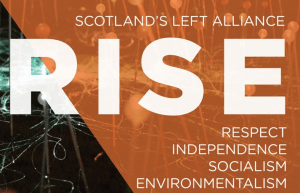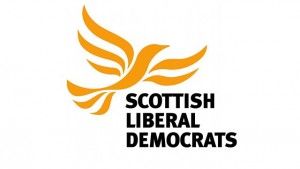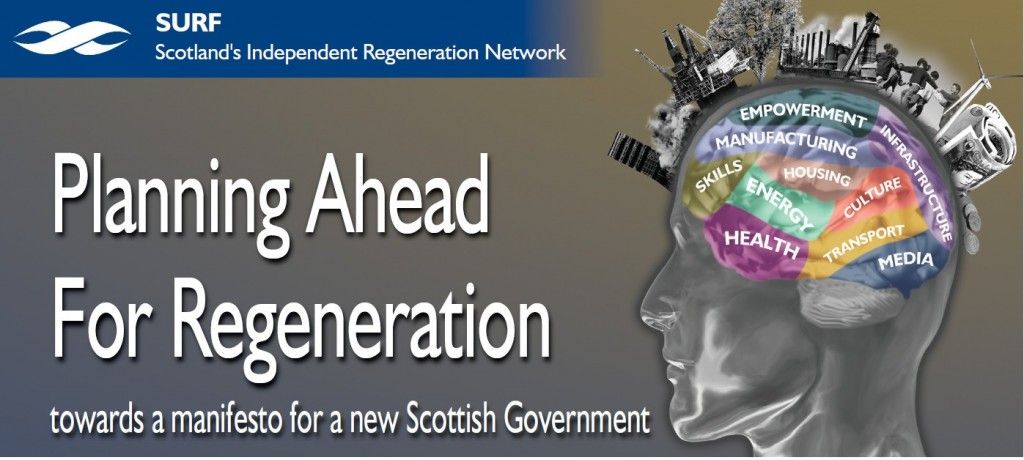In January, SURF launched a 2016 Manifesto for Community Regeneration. It was developed via extensive consultations with the SURF network since late 2014.
The manifesto’s central purpose is to influence national regeneration policy. To that end we presented nine ‘bold and practical’ proposals for the next Scottish Government to consider.
It was formally submitted to Scotland’s main political parties along with an invitation to participate in our Scottish Regeneration Question Time hustings-style debate in Edinburgh on 7 April (we will be sharing a transcript, video and podcast of that event prior to the election).
In this item, SURF looks at the manifestos from the seven main parties that feature in national opinion polls for the upcoming Scottish Parliament elections. We pick out the main regeneration-related policies featured in each, and look at the extent to which SURF’s nine policy recommendations are reflected in their content (the order is a-z by party).
 RISE: Scotland’s Left Alliance
RISE: Scotland’s Left Alliance
Manifesto launch date: 19 April 2016
Main regeneration-related policies:
- A “more determined” programme of land reform, with a cap on landholdings and the right for communities to buy land through Compulsory Purchase Orders;
- Construction of 100k new “publicly owned, democratically managed, and environmentally friendly houses”;
- Establishment of a community led convention tasked with restructuring local government including “bring[ing] back democratic representation for towns and villages”;
- New programme of public investment in Scotland’s economy funded by tax changes including income tax increases for those earning more than £50k/yr, a local Scottish Service Tax to replace the Council Tax, and a new duty on whisky;
- Support for “community youth services in Scotland’s poorest areas”;
- Transition to a public transport system that is free at the point of use.
How many of SURF’s proposals appear?
One – “Ultimately, RISE hopes to establish a Scottish Universal Basic Income”, which is close to SURF’s recommendation for a small-scale Citizen’s Income pilot to explore its potential for addressing poverty and inequality (SURF proposal no. 7). Land reform and transport policy commitments also feature prominently in the RISE manifesto. In addition to presenting nine policy recommendations, SURF’s manifesto highlighted land and transport as two key areas of opportunity.
Scottish Conservatives
Manifesto launch date: 13 April 2016
Main regeneration-related policies:
- Building 100k new homes in the next term of Parliament;
- Capital infrastructure investment to increase from present £80m/yr to £340m /yr by 2020/21, to support energy efficiency of existing housing stock;
- Creation of a South of Scotland Enterprise agency to replicate the social role of Highlands & Islands Enterprise;
- Help to Rebuild: a £30m annual rationalisation and enhancement of existing grant and loan schemes to bring empty homes back into use;
- Major planning applications consistent with Local Development Plan to be decided by local authorities instead of Scottish Ministers;
- Regeneration Zones: Providing incentives such as business rates relief and fast-track planning applications to encourage businesses to invest in specific places;
- Re-establishing the Town Centre Regeneration Fund with a £30m annual commitment;
- Seeking “balance” in land reform legislation by continuing “to stand up against measures that undermine individual property rights”.
How many of SURF’s proposals appear?
Two – “Procurement policy should generally aim to increase participation of SMEs” (SURF proposal no. 8), and the creation of a new economic development agency for non-Highland Scotland (SURF proposal no. 9). There is also some overlap with ‘Regeneration Zones’/Town Centre Regeneration Fund commitments and SURF’s call for a new place-based regeneration programme and regeneration strategy (SURF proposals no. 1 and 3), and enhanced support for social enterprises is stated (part of SURF proposal no. 5). In addition, the Conservatives’ manifesto features improved transport links in rural communities, which was a recurring theme in SURF’s consultations.
Manifesto Link – Scottish Conservatives
Scottish Greens
Manifesto launch date: 12 April 2016
Main regeneration-related policies:
- A commitment to place “good health, equality and wellbeing” at the foundation of all Scottish Government policy;
- Address fuel poverty through a range of measures including combined heat and power (CHP) systems and high energy efficiency standards in new build housing and retrofitting;
- Build “thousands more good quality, affordable, sustainable homes” through mechanisms such as a property tax designed to help bring empty homes back into use and implementation of rates on vacant and derelict land to encourage development;
- Enhanced investment in Further Education and support for a ‘Scotland Guarantee’ of a job, training or education for every school-leaver, including a new employability scheme to replace the Work Programme;
- Establishment of an independent Technology and Society Forum to “improve digital access across Scotland”;
- Higher investment in the planning system, with new powers for communities including increased control over public land such as national forests and Crown Estate properties;
- Support for a “managed transition plan” to create over 200k jobs in renewable energy industries by 2035.
How many of SURF’s proposals appear?
Four – a realignment of the planning system (SURF proposal no. 4), enhanced support for community led regeneration and social enterprise (SURF proposal no. 5), procurement reform (SURF proposal no. 8), and “the creation of an economic development agency for areas not covered by Highlands & Islands Enterprise” (SURF proposal no. 9). The SURF manifesto’s two overarching context elements – the use and ownership of land and the importance of accessible transport infrastructure – are also recognised.
Manifesto link – Scottish Greens
Scottish Labour
 Manifesto launch date: 27 April 2016
Manifesto launch date: 27 April 2016
Main regeneration-related policies:
- An Anti-Poverty Bill implementing all 15 policy recommendations set out by the academic Naomi Eisenstadt in her 2016 ’Shifting the Curve’ report to the First Minister;
- Building 60k affordable homes, 45k of which will be available for rent by councils and housing associations;
- Creating a ‘Fair Start Fund’ to reduce the inequality gap in outcomes in the education system;
- Introduce a Warm Homes Act to address poverty, health and energy efficiency concerns;
- Planning system reform measures including creating new powers “to allow councils to compel the sale of derelict and brownfield land for early development”.
- Review of the Land Reform Act, including the introduction of mechanisms set out by the Land Reform Review Group;
- Tax changes, including a 1p income tax rise and a new 50% band, to raise £1.2bn a year for investment in schools and public services.
How many of SURF’s proposals appear?
Two – commencing the socio-economic duty in the Equality Act 2010 via Naomi Eisenstadt’s recommendation (SURF proposal no. 2), and enhanced support for community groups, social enterprises and cultural organisations (SURF proposal no. 5). Less directly, the Anti-Poverty Bill also addresses some other SURF proposals, while plans to review land reform legislation and Scotland’s public transport system parallel concerns raised in our consultations.
 Scottish Liberal Democrats
Scottish Liberal Democrats
Manifesto launch date: 15 April 2016
Main regeneration-related policies:
- Build 50,000 affordable homes over the next Parliament, 80% allocated for social rent;
- Decentralise domestic and business taxation “to give local councils control of more than 50% of their revenues”;
- Develop new building standards for energy efficiency in new and existing housing, based on Denmark’s incremental approach;
- Introduce an Islands Act to enable variation of national services “to make them more suitable for islands”;
- New powers for local communities to establish a “burgh council to serve their area”, to support community empowerment and public service delivery;
- Raise £0.5bn for investment in the education system through 1p income tax rise, with actions including a Pupil Premium targeted at those from disadvantaged backgrounds;
- Review current empty homes strategies, introduce a ‘Help to Renovate’ scheme to bring vacant housing back into use, and revisit Commission on Local Tax Reform’s Land Value Tax proposal.
How many of SURF’s proposals appear?
One – enhanced support for community led regeneration and social enterprises (SURF proposal no. 5). SURF’s manifesto also highlighted land use and transport as overarching regeneration concerns; the Lib Dem manifesto calls for continued implementation of the Land Reform Act accompanied by a review in 2020/21 and innovations in the public transport system.
Manifesto link – Scottish Lib Dems
 Scottish National Party
Scottish National Party
Manifesto launch date: 20 April 2016
Main regeneration-related commitments:
- Appointment of a Poverty and Inequality Commission and delivery of a Fairer Scotland Action Plan to address poverty at the community level;
- Commitment to grow and develop City Deals, Town Centre Partnerships and Regional Economic Partnerships;
- Introduction of a Warm Homes Bill to tackle fuel poverty;
- Invest over £3bn in next Parliament to deliver “at least 50k new affordable houses, of which at least 35k will be houses for social rent”;
- Review and reform of Community Planning Partnerships “so they are better placed to drive reform, including through use of citizens’ panels and town hall meetings”;
- Land Reform: Maintain commitment to 1m acres of land in community ownership by 2020 and “modernise and improve” compulsory sales orders;
- Participatory Budgeting: “Setting councils a target of having at least 1% of their budget subject to Community Choices budgeting”.
How many of SURF’s manifesto proposals appear?
Three – “commence the socio-economic duty contained in the Equalities Act 2010” (SURF proposal no. 2), reform of the Community Planning system (SURF proposal no. 4), and enhanced support for community led regeneration and social enterprise (SURF proposal no.5).
There are further overlaps around: SNP manifesto commitment for a Fairer Scotland anti-poverty strategy and SURF’s call for a new regeneration strategy (SURF proposal no.3); the SNP statement of further investment in the Community Jobs Scotland programme and SURF’s proposal for a direct job creation programme in disadvantaged places (SURF proposal no. 6); and SNP support for greater social enterprise participation in procurement processes and SURF’s recommendation for procurement reform (SURF proposal no. 8). Finally, the SNP manifesto commitments towards further land reform and investment in low-carbon transport infrastructure parallel the SURF manifesto’s key context elements of land and transport.
 UK Independence Party
UK Independence Party
Manifesto launch date: 7 April 2016
Main regeneration-related policies:
- 30 minutes of free parking to support economic activity in town centres and high streets;
- A “Brown Field First” policy for new housing developments, supported by stamp duty exemptions and new planning regulations;
- Construction of 50k units of social and affordable housing over the next term of Parliament;
- Identification of government-owned vacant land, “so it can be released for affordable developments”;
- Local government legislation to enable “binding local referenda on important local issues”;
- Repeal of the 2015 Land Reform (Scotland) Bill and redirection of “the cost of implementing the reforms” into public services and infrastructure.
How many of SURF’s proposals appear?
None, although a desire to improve transport links in rural communities is stated. In addition to the nine policy recommendations, SURF’s manifesto featured two additional context elements that were raised repeatedly in our consultations, one of which was accessible and efficient transport infrastructure for all communities.

Read SURF’s 2016 Manifesto for Community Regeneration by clicking here (PDF format).
SURF also maintains a matrix of manifestos produced by other umbrella and network bodies in Scotland for the 2016 elections, including CoSLA, RTPI Scotland and the Federation of Small Businesses.
For any queries about SURF’s 2016 Manifesto for Community Regeneration, please contact SURF Policy & Participation Manager Derek Rankine on 0141 440 6393 or derek@scotregen.co.uk.
